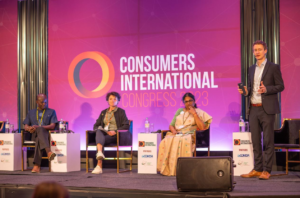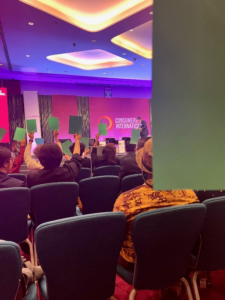Final day of Congress and the pace remained fast and fascinating with enlightening presentations with a key focus on sustainability to close off the conference. Below are some highlights from Day 3.
Sustainable appliances for a green transition
An inspiring and thought-provoking session featuring research on priority appliances that lead to environmentally-positive outcomes. CLASP researchers shared that while appliances touch every aspect of our day, they’re responsible for 39.3% of energy-related CO2 emissions while at the same time billions of people do not own appliances to live healthy, productive lives. Ten appliances such as LED lighting, refrigerators and heat pumps have been recognised as the top priority for energy transition to close the CO2 gap. The session also featured an induction cooktop manufacturer, Burn Manufacturing, that is making energy-efficient electric cooking appliances that are affordable, repairable and recyclable a reality across many countries. The session was an insight into the possibility of innovation that is consumer and environmental-centric that can lead to meaningful change.
More on Net Zero Heroes Project: https://www.clasp.ngo/report/net-zero-heroes/

Sustainable by default
While clear and substantiated green claims can give consumers meaningful choice, what if sustainability was no longer about choice but was accessible by default? The panel noted that currently sustainability is a luxury, often featuring products and services that are more expensive than their not-so-environmentally friendly counterparts. With the potential to reduce 70% of greenhouse gas emissions through demand-side interventions, the panel discussed ideas such as taxing non-sustainable products so they become the more expensive option, incentivising businesses to introduce buy-back programs for their products (e.g. IKEA), manufacturing products with longevity in mind and ensuring access to local repairs. Ideally regulatory frameworks need to pivot to make sustainable choice the easy choice for both consumers and businesses.
Consumers International launched its new consumer insights research into sustainability which found that 62% of consumers are willing and eager to change their purchasing habits to reduce their environmental impact. For more, check out: New Report: Unlocking sustainable living through global consumer insights – Consumers International

Energy efficiency for the good of the planet
With 36 million individuals worldwide installing solar on rooftops and surpassing government spending on climate, it’s clear that consumers are committed and doing their part towards achieving clean energy outcomes. The panel discussed a prosumer approach, emphasising that consumer-owned renewable can lead to benefits for both people and the planet. However, affordability is a pivotal factor, particularly in low and middle-income countries. In many countries, transition has been slow and accessibility limited for many consumers. There is a need for a holistic approach to the clean energy product lifecycle, from financing to end-of-life management, while also reducing costs that act as a barrier and lead to unequal distribution of renewable energy investments globally. Examples from Malawi showcase the importance of consumer-friendly models, combining grant funding and pay-as-you-go approaches for wider accessibility. As the world transitions towards a prosumer energy paradigm, questions arise about corporate responsibility, urging major oil companies to invest in clean energy, given their substantial profits.
Australia-pacific member connect session
Regional member connect sessions are a wonderful opportunity to interact with consumer organisations from neighbouring countries and consider the synergies that lie in collaboration (a key theme across the conference). Reflecting on the conference, members noted the similarities of issues and thematic focus globally, despite the diversity in cultures and consumer protection laws. It was a key sign that cross-border collaboration is not only beneficial but potentially critical in building resilience across the consumer movement.
Conference close and council elections
While challenging times lay ahead, Consumers International’s Director-General, Helena Leurent, noted the optimism and hope throughout the conference on the change that consumer organisations can bring together across the next four years. We, as consumer organisations, were urged to continue collaborating, and also being open to collaboration with “unusual suspects”, in acknowledgement of pro-consumer work that is being done across other sectors, including within industry.
The conference’s last formal proceedings included the council elections. Dr Marimuthu Nadason was reinstated as President of Consumers International. A new council was elected, including Rosie Thomas from CHOICE, representing Australia. Congratulations Rosie and to all the newly elected council members.

And that’s it from Kenya! It has been a wonderful three days connecting with brilliant consumer advocates, experts, academics and consumer-centric industry leaders who are all working towards ensuring that marketplaces can effectively support consumers from intention to action.
Image source: Consumers International